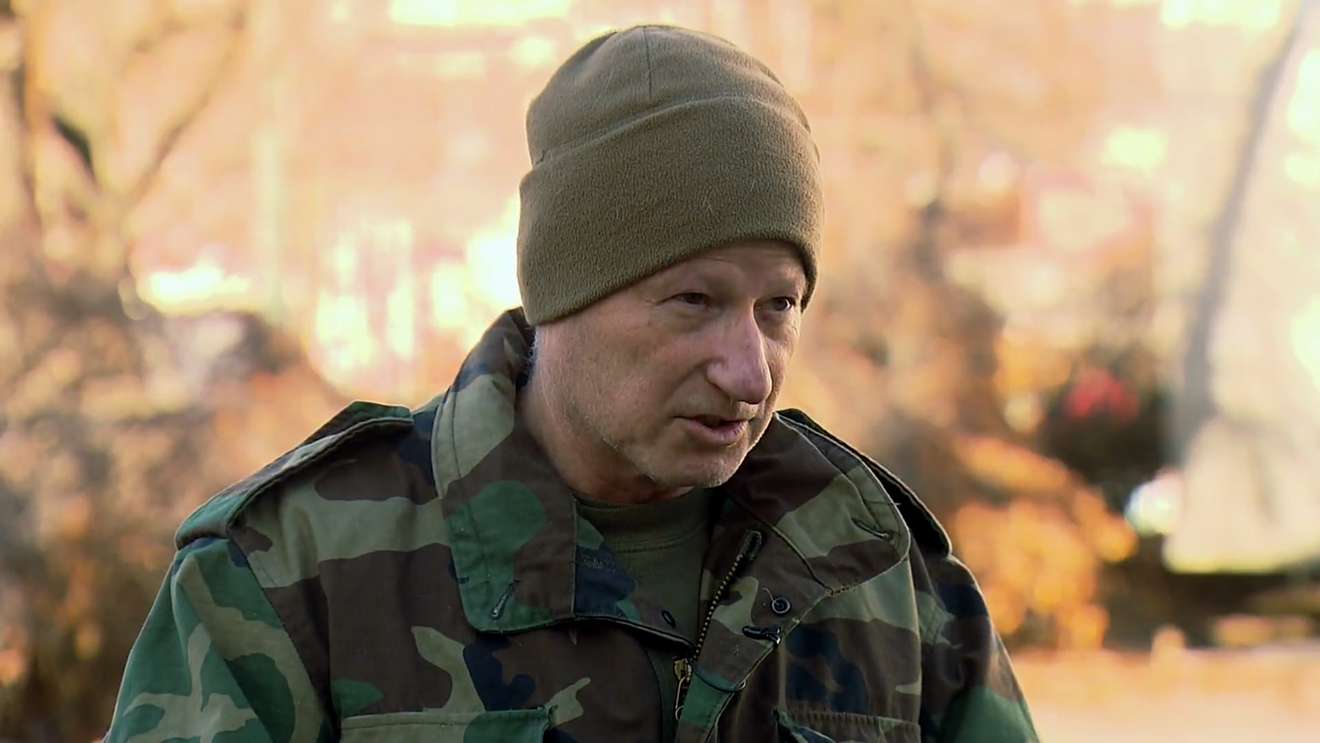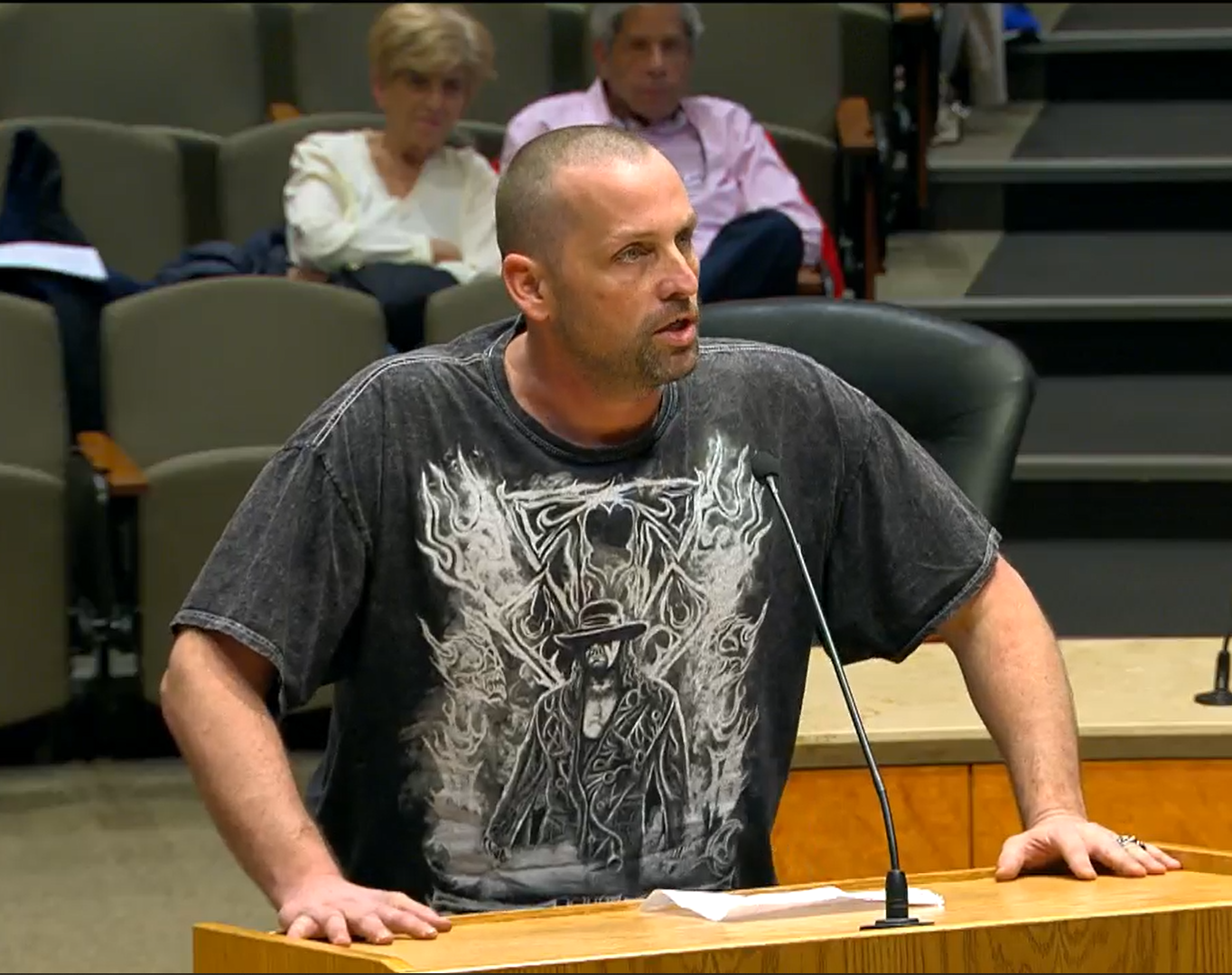
Conor McCormick-Cavanagh

Audio By Carbonatix
After a contentious multi-hour debate, Aurora City Council voted 6-5 to approve an urban camping ban that will be used to justify dispersing homeless encampments.
“This proposal is the one step that we can take as a local government to start to push some of those people who are in encampments, who disassociated from society and from support, into a shelter situation, where they can get [services],” said at-large council rep Dustin Zvonek before voting for the ban during the February 28 meeting.
The ordinance, brought forward by Mayor Mike Coffman, calls for banning camping on public property and allowing city officials to sweep encampments after providing a minimum notice of 72 hours and ensuring that there is adequate shelter space available for encampment residents.
The council will take another vote on the proposed ordinance on March 14, after the second reading; if it is again approved, it will become law.
The first vote fell largely along partisan lines. The five Republicans on council voted in favor of the ban, while the four Democrats and one unaffiliated member opposed the measure. Since there was a 5-5 tie, Mayor Coffman broke the tie, approving the measure he’d proposed.
Before the vote, Aurora City Council members listened to community members during a lengthy public hearing. A minority of those encouraged council to pass the ordinance.
“It is not enough for our citizens to be placed on the sidewalk or under a bridge or in our sewers. As a state, we’re better than that. We are our brothers’ keepers. And sometimes that means we have to help our citizens when they don’t seem to know they need help,” said Danny Moore, a Republican who served on the Colorado congressional redistricting committee.
But the vast majority of the dozens of people who spoke during the hearing, including representatives of Healthier Colorado and the Colorado Coalition for the Homeless, testified against the ordinance.
“If you sweep me away, I’m going to die alone. Or you’re going to have your friends lock me up in jail. Is that what I deserve?” asked Omen Cross, who identified himself as a homeless veteran who lives in Aurora. “Mr. Mayor, I officially challenge you for the title of mayor,” Cross said loudly, garnering a rebuke from Mayor Pro Tem Francoise Bergan, who was presiding over the debate. Bergan then ordered the council into a ten-minute recess before the meeting resumed.
Aurora’s proposed camping ban would bring the homelessness enforcement policy of the metro area’s second-largest municipality and Colorado’s third-largest city in line with that of the City of Denver, which has had a camping ban in place since 2012.

Homeless Mike was on the streets for a week.
CBS4
Coffman, who lost his 6th Congressional District seat to Democrat Jason Crow in 2018, was elected mayor of Aurora in late 2019. He first proposed the idea of establishing a camping ban in October 2020. At the end of that year, Coffman spent a week living anonymously on the streets of metro Denver; the mayor stayed in a shelter and also lived outdoors, where a camera crew filmed him.
In subsequent coverage of “Homeless Mike,” Mayor Coffman told CBS4: “These encampments are not a product of an economy under COVID. They are not a product of rental rates, housing. They are a product of a drug culture.” The people he met were not homeless because of a lack of shelter, he added. “Absolutely not. It is a lifestyle choice, and it is a very dangerous lifestyle choice.”
Some of those who testified in opposition to the ordinance criticized Coffman for the “Homeless Mike” stint. “That was a vacation for you,” said Joel Northam, an organizer for the Party of Socialism and Liberation, which rallied members to attend the hearing. In 2020, Northam got hit with criminal charges after participating in a protest demanding justice for Elijah McClain outside Aurora Police Department headquarters; those charges were eventually dropped.
Coffman had officially introduced a camping-ban proposal last summer but was unable to secure a majority vote in August. Then, in November, the political tides shifted on Aurora City Council.
After the election, Coffman reintroduced his camping-ban proposal.

Omen Cross spoke out against the camping-ban ordinance.
AuroraTV
While failing to abide by Aurora’s camping ban would not carry an explicit punishment, people who refuse to move from an encampment could be subject to a citation for failure to obey a lawful order, which can carry a penalty of up to 364 days in jail and a fine of up to $2,650.
The Denver Police Department rarely issues tickets for violations of the city’s camping ban. But authorities frequently cite the law when asking people to move, and as they do, it disrupts connections that service providers have established with people experiencing homelessness.
Denver has gotten into legal trouble over its camping ban; in October 2020, Andy McNulty of the Killmer, Lane & Newman law firm filed a lawsuit on behalf of homeless plaintiffs and Denver Homeless Out Loud, which resulted in an order from Judge William J. Martinez of the U.S. District Court of Colorado requiring a week’s notice before the city conducts a sweep.
In crafting his own proposal that calls for 72 hours’ notice, Coffman says he looked at that order, as well as policies in Boston, Oakland and Arvada.
The 2021 Point in Time count showed that there were 594 people staying in shelters in Aurora on a single night in January of that year. (Service providers did not conduct an unsheltered count in 2021, owing to concerns about COVID spread; the results of the 2022 count have not yet been released.) Aurora has emergency sheltering capacity – including pallet homes, safe-camping sites and safe-parking sites – of approximately 300 beds; it can increase its capacity in cold-weather situations, officials say.
There are also countless people staying in unsheltered settings. Until now, outreach workers have worked with the Aurora Police Department to clear encampments, but there hasn’t been a set 72-hour timeline.
This story has been updated to add the second vote on the proposed ordinance, set for March 14.